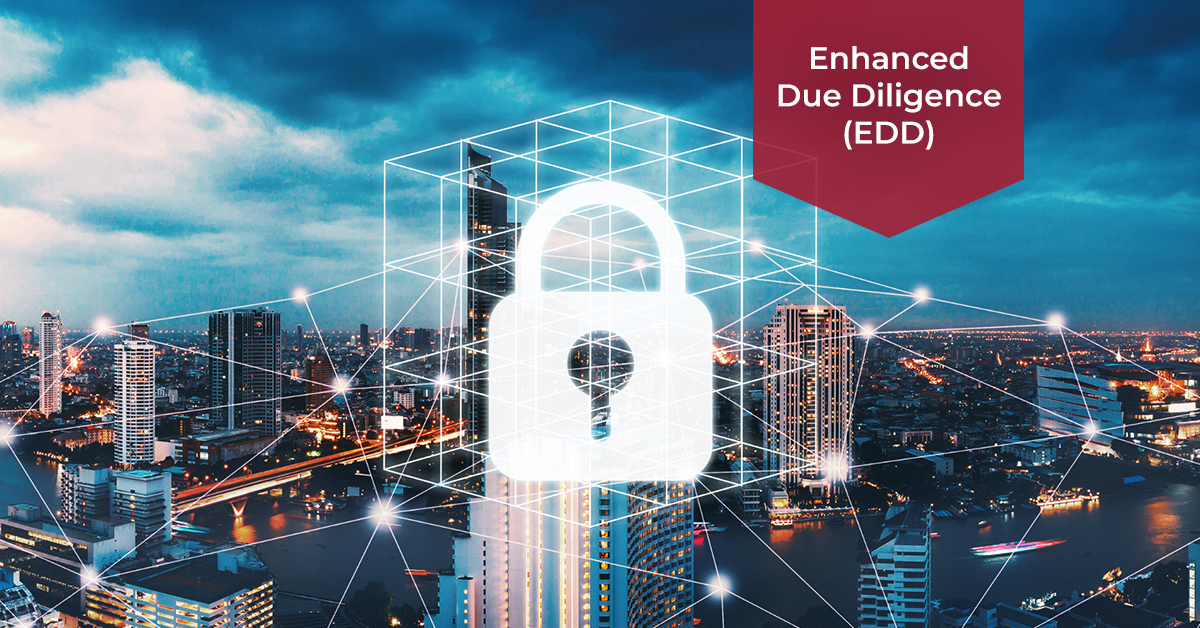
What is Enhanced Due Diligence (EDD)?
Enhanced Due Diligence (EDD) is a risk-sensitive form of Customer Due Diligence (CDD). Enhanced Due Diligence (EDD) is applied to the higher-risk customers and requires more detailed information about the customer in addition to the basic Customer Due Diligence (CDD) requirements. High-risk customer means that those who are associated with increased probability of getting involved in money laundering or terrorism financing crimes. FATF (Financial Action Task Force) international standards demand to apply an additional risk-based approach to the Customer Due Diligence process when the customer has the potential to be a high-risk one.
Enhanced Due Diligence (EDD) is one of the essential components of Know Your Customer (KYC), customer onboarding and Anti-Money Laundering (AML) processes.
Enhanced Due Diligence (EDD) Requirements
To perform an effective Enhanced Due Diligence EDD process, site visit of the customer might be necessary along with these information:
- Background information
- Source of funds
- Source and structure of wealth
- Adverse media screening
Difference Between Customer Due Diligence (CDD) and Enhanced Due Diligence (EDD)
The main difference between Customer Due Diligence (CDD) and Enhanced Due Diligence (EDD) is that Customer Due Diligence (CDD) remains a less strict customer verification process as it only requires id information, address and assesses the risk category of the customer. However, Enhanced Due Diligence (EDD) is a more detailed and risk-sensitive approach to analyze a customer who is a potential for high-risk category according to the Know Your Customer (KYC) risk rating system.
Why and When Enhanced Due Diligence (EDD) is necessary?
Politically exposed persons (PEPs) are classified as high-risk customers as defined by FATF standards. They are prone to corruption and abuse their positions for activities such as money laundering. Therefore, a detailed, risk-sensitive analysis of such customers is essential for the purpose of Anti-Money Laundering (AML) and prevention of other financial crimes.
Who are entitled with Enhanced Due Diligence (EDD)?
Enhanced Due Diligence (EDD) process can be applied to individuals (PEPs or senior foreign political figures (SPF)), businesses (internet-only businesses, law firms or cash-sensitive businesses), financial institutions (banks, non-bank FIs and other FIs) and for governments with high-risk factors. The EDD requirements may vary and change based on the type of the client.
Enhanced Due Diligence (EDD) Risk Factors
- Customer-related risk factors:
- The majority of the clients are foreigners or non-residents
- The Politically Exposed Person’s (PEP) close relatives and associates
- Legal individuals who function as the vehicles of personal asset-holding
- Nominee shareholders or shares in the company’s bearer form
- Cash-intensive businesses
- Territory-related risk factors:
- Countries without adequate Anti-Money Laundering (AML) and/or Combating the Financing of Terrorism (CFT) systems
- Countries under sanctions and embargoes
- Countries notorious for extensive levels of corruption
- Countries blacklisted for financing or supporting terrorist activities
- Locations where terrorist organizations operate
- Сountries that are not FATF members
- Other risk factors:
- Private and correspondent banking which are revenue-driven and give favorable amount of importance to keep the level of confidentiality at the highest. Therefore, they are naturally eligible for money laundering.
In order to operate effective Know Your Customer (KYC) processes to prevent financial crimes and remain compliant with Anti-Money Laundering (AML) and Combating the Financing of Terrorism (CFT) regulations, it is vitally essential for the organizations to take the necessary precautions and apply successful Customer Due Diligence (CDD) and Enhanced Due Diligence (EDD) checks.
